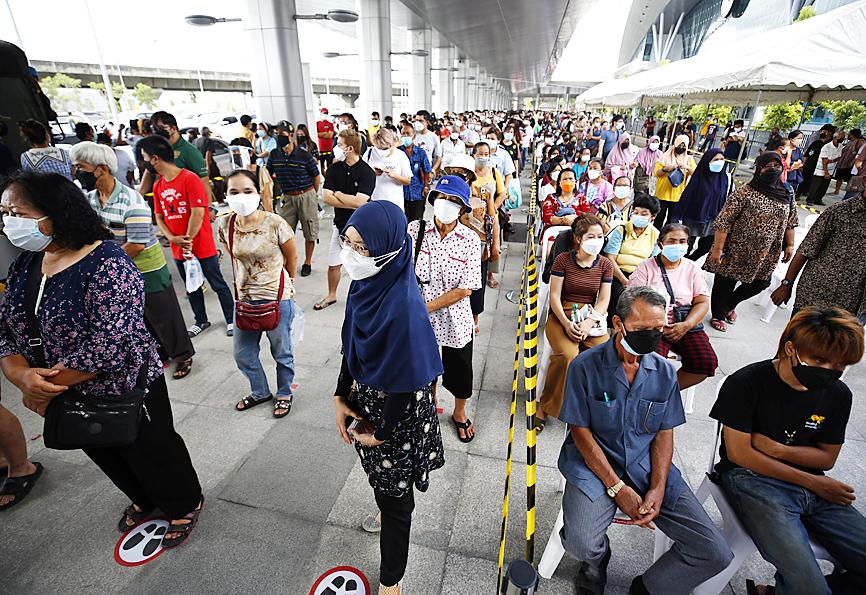Thailand has begun using sleeper trains to transport COVID-19 cases out of Bangkok, where hospitals have been overwhelmed by a surge in numbers.
The first train left the capital on Tuesday, transporting 137 cases who were asymptomatic or had mild symptoms to their hometowns in the northeast of the country.
Thailand is facing its third and most severe wave of the virus since the start of the COVID-19 pandemic, driven by the Delta variant of SARS-CoV-2, which has spread widely across the capital. Hospitals have been forced to treat cases in vehicle parking areas and to turn away people who are severely ill.

Photo: EPA-EFE
Since April, the country’s total fatalities have grown from fewer than 100 to 4,397.
Yesterday, 16,533 cases and 133 deaths were reported.
Thai Minister of Public Health Anutin Charnvirakul on Tuesday said the service would move cases who were unable to access treatment in Bangkok.
“The process is all secured, because they will be closely monitored by doctors and staff and won’t stop anywhere. There will be an emergency team and ambulance standby at the destination,” he said.
Buses, vans and planes might also be used to move people across the country, he said.
A further 15 carriages would be used to isolate cases who are awaiting hospital beds in Bangkok.
A doctor from the group Mor Mai Thon (Doctors Won’t Tolerate It), which has criticized the government response, described the situation in Bangkok as critical.
“It has reached the point where people cannot access medical care at all, which has never happened before. There are a huge number of people who can’t get treated,” said the doctor, who asked to remain anonymous.
Moving people with mild symptoms could help Bangkok in the short term, the doctor said.
However, they said that if such cases developed more severe symptoms, it could overwhelm hospitals in other areas of the country, where there are fewer intensive care beds.
“The Delta variant is very strong, 50 percent of the patients develop a severe condition,” they said.
The government should focus on expanding testing capacity, the doctor said, while medicines need to be given more quickly to cases to prevent their illness from deteriorating.
About 70,000 tests are performed each day, with 20.5 percent returning positive. Demand for testing is so high that long lines stretch outside hospitals where swabs are conducted.
Thailand managed to escape the worst of the virus last year, when it introduced strict lockdown measures, and rolled out test and trace systems. Critics have accused the government of complacency since then, especially in relation to the country’s vaccination campaign, which has suffered from delays and shortages.
About 5 percent of the Thai population is fully vaccinated, while 12.4 percent have received one dose, according to Our World in Data.
Mor Mai Thon is calling for greater transparency around the government’s vaccine contracts and for officials to focus on procuring a greater variety of doses.
Thailand is relying on AstraZeneca and Sinovac. However, studies have found that Sinovac’s efficacy falls 40 days after the second dose. Growing numbers of Thai medics — who were given this vaccine earlier in the year — have become infected.

Indonesia and Malaysia have become the first countries to block Grok, the artificial intelligence (AI) chatbot developed by Elon Musk’s xAI, after authorities said it was being misused to generate sexually explicit and nonconsensual images. The moves reflect growing global concern over generative AI tools that can produce realistic images, sound and text, while existing safeguards fail to prevent their abuse. The Grok chatbot, which is accessed through Musk’s social media platform X, has been criticized for generating manipulated images, including depictions of women in bikinis or sexually explicit poses, as well as images involving children. Regulators in the two Southeast Asian

COMMUNIST ALIGNMENT: To Lam wants to combine party chief and state presidency roles, with the decision resting on the election of 200 new party delegates next week Communist Party of Vietnam General Secretary To Lam is seeking to combine his party role with the state presidency, officials said, in a move that would align Vietnam’s political structure more closely to China’s, where President Xi Jinping (習近平) heads the party and state. Next week about 1,600 delegates are to gather in Hanoi to commence a week-long communist party congress, held every five years to select new leaders and set policy goals for the single-party state. Lam, 68, bade for both top positions at a party meeting last month, seeking initial party approval ahead of the congress, three people briefed by

Yemen’s separatist leader has vowed to keep working for an independent state in the country’s south, in his first social media post since he disappeared earlier this month after his group briefly seized swathes of territory. Aidarous al-Zubaidi’s United Arab Emirates (UAE)-backed Southern Transitional Council (STC) forces last month captured two Yemeni provinces in an offensive that was rolled back by Saudi strikes and Riyadh’s allied forces on the ground. Al-Zubaidi then disappeared after he failed to board a flight to Riyadh for talks earlier this month, with Saudi Arabia accusing him of fleeing to Abu Dhabi, while supporters insisted he was

The Chinese Embassy in Manila yesterday said it has filed a diplomatic protest against a Philippine Coast Guard spokesman over a social media post that included cartoonish images of Chinese President Xi Jinping (習近平). Philippine Coast Guard spokesman Jay Tarriela and an embassy official had been trading barbs since last week over issues concerning the disputed South China Sea. The crucial waterway, which Beijing claims historic rights to despite an international ruling that its assertion has no legal basis, has been the site of repeated clashes between Chinese and Philippine vessels. Tarriela’s Facebook post on Wednesday included a photo of him giving a